 Adriana Modersitzki
Adriana Modersitzki
Do you have a teen who’s about to apply for their first job? They’re probably feeling excited at the prospect of earning their own money, being a bit more independent, and making new friends. But first thing’s first: if they want to get a job, they’ll need a resume.
Writing a resume for your teen (or helping them write their own) might sound simple… after all, there’s not a lot to write about yet. But in some ways, that’s what makes it more challenging.
I’ve put together some tips and a super basic format to make it as simple as possible to write a resume for your teen. You might be surprised at just how much experience they already have and how impressive their resume can look, even if they’ve never had a job before.
Before we get into it…
Let’s state the obvious for a sec. It can feel like catch-22 for your teen when it comes to applying for a job. You need a job to get experience. But you need experience to get a job. A well-written resume bridges the gap so that a school-leaver or student who’s never worked before can demonstrate enough experience and value to secure a paid job.
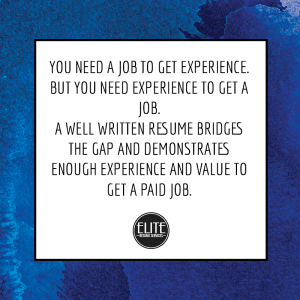
Bridging this gap means writing their resume a little differently than, say, your own… since you’ve probably got a couple of decades of professional experience to talk about! You’ll have to think outside the box about what counts as “work” experience.
To make it super easy for you, I’ve created a basic layout for a teen’s resume below. I’ll walk you through it with instructions on what to write under each heading.
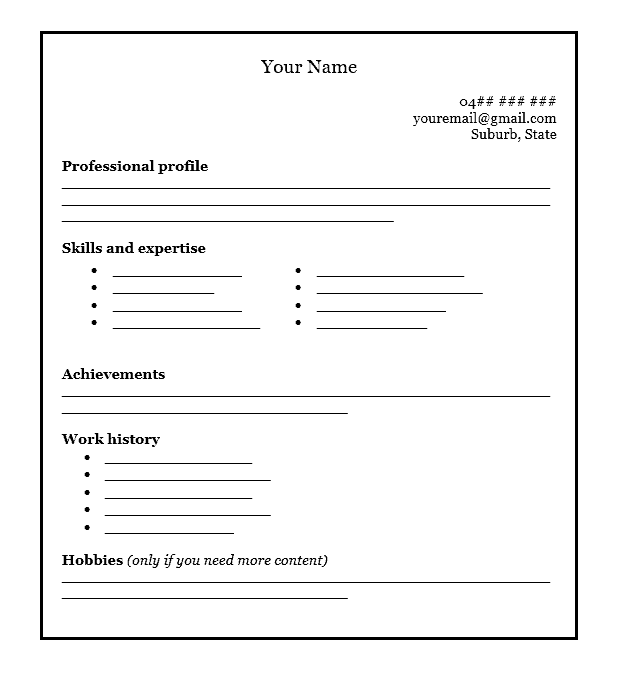
The standard resume format includes a clear heading at the top with the applicant’s name. Just under that you’ll include the applicant’s contact details:
● Mobile
● Email
● Location (suburb and state)
Don’t get fancy – make it super easy for the hiring manager to find the information they’re looking for.
Just a note on contact details. If your child has their own email address, make sure it’s something sensible. Ideally, it should resemble their name and not include any words that might give the wrong impression. If not, have them set up a professional email address through a free host like Gmail. And ask them to consider what might happen if they miss a call. Do they have a sensible voicemail message set up? If not, they’ll need to fix that too.
Tip: You don’t need as much contact info on your resume as you used to a few years ago. Date of birth, marital status, fax number, multiple phone numbers, and street numbers aren’t really necessary. Oh and while I’m at it… leave your photo off as well!
Right underneath the contact details, you’ll include the professional profile. Obviously, a professional profile for a teenager’s first resume is going to be very different from someone who’s studied at a higher level or had years of experience in the workplace. Instead of professional skills, you can talk about any soft skills that will support them in the workplace.
Things you might mention (if they’re true for your teen) include:
You could use this opportunity to talk about where they’ve picked up these skills. For example, volunteering with a community group or being involved at school. If your teenager has their own transport, like a car and driver’s licence, this is a great place to mention it as well.
Use the professional profile to give a snapshot of your teen and the attributes that will make them a good candidate for the job. Don’t make it too long – a short paragraph is enough for this section. You’ll get the chance to talk about the specifics in the next couple of sections. We want to make sure this is a smoothly written paragraph. Think along the lines of a blurb on the back of a book, rather than disjointed sentences.
This next section can seem a bit tricky at first. After all, it probably looks like your teen is rather short in the skills and expertise department! But once again, I try to bring this back to soft skills backed by any relevant real-life experiences.
But before we do that, let’s take a step back. Think about the kind of job your teenager is applying for. Usually, first jobs will fall under one of four categories: manual labour, retail, hospitality, and care.
They’ll probably start out performing very basic tasks on weekends, the occasional afternoon and through the school holidays. These tasks (while they can be challenging at times) don’t require a huge amount of upfront knowledge or technical skills. What your teen really needs to succeed in these roles are soft skills and abilities they’ve already picked up through school, from after-school activities like sports and from other life experiences. If you can demonstrate these skills to the hiring manager, you’ll have a much better chance of landing an interview… and then hopefully a job.
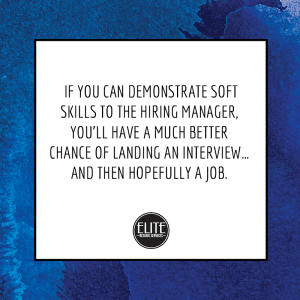
Let me give you some examples of how you might match soft skills and life experiences to the job your teen’s going for.
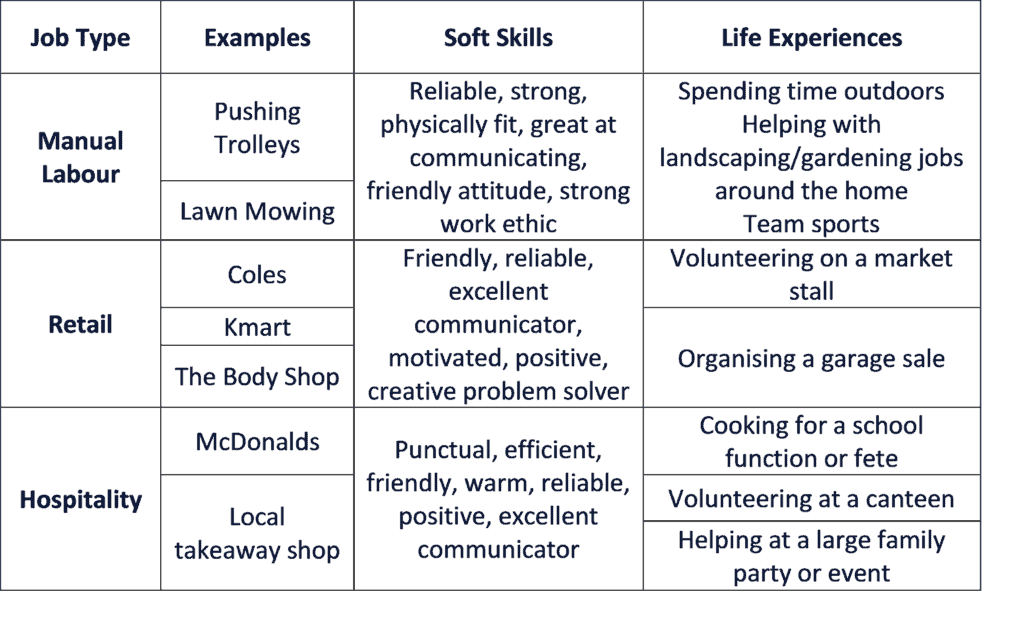
For example, if I think back far enough, I can remember I used to volunteer at a store around the corner from my mum and dad’s business. It was an op shop with a café attached to it, and they took on volunteers. It was actually a great opportunity to practice some real work skills before I got my first real job – not to mention I got a referee to include on my resume that I WASN’T related to! I learned how to work the coffee machine, do basic food handling and prep and follow hygiene practices. Add to that learning the importance of good communication, putting a smile on my face, and turning up on time. If I was writing a resume for teenage-me, those are absolutely things I’d include under skills and expertise.
The next section on their resume is “Achievements”. Once again, since your teenager hasn’t really worked before, you might have to think outside the box a little. So, ask yourself (or ask your teen)… what things have they done so far in life that they’re proud of? What have they done that’s different to most of their peers? Here are a few ideas of achievements that might apply to your teen:
While your teen may not have real work experience yet, they probably have some of the above achievements they can talk about. And they’re worth mentioning on their resume because they tell a story about what your teen is like as a person and can perhaps indicate what they’ll be capable of in the workplace.
For example, I helped a young man with his resume recently and he was able to multitask like a CHAMP. We illustrated this by talking about how he’d represented his school at an extremely high level of sport. By demonstrating how he balanced his sporting and schooling commitments (including HSC prep!) we were able to reinforce his maturity, ability to multitask and manage competing priorities.
Having a “Work History” section for someone who’s never worked before might seem a little odd. But this section is standard for all resumes and there are still plenty of things you can include here. You just need to get creative. I don’t mean making stuff up… I mean interpreting certain activities as work-related even if they weren’t technically paid work.
For example:
Why are these relevant? Your teen has to turn up at a certain time, they have set tasks to complete, they’re working under others, and engaging as part of the team.
You might also use this section to talk about school. After all, it’s no secret that your teen is still in school or has recently left. So, you might talk about what school they’re at and what year they’re in (or when they graduated). But you don’t need to go into detail on grades and subjects.
Tip: When you write the cover letter, you could potentially talk about grades and subjects a little if it’s relevant. For example, if your teen’s pretty good at maths and they’re applying for a retail job that involves cash handling, it might be worth mentioning.
So, what about the “Hobbies” section? I always advise against including these in a professional resume, even for a teenager, because I just don’t feel like it adds value. If you have enough content elsewhere, I’d strongly recommend leaving this section out.
The only reason you’d keep it might be if their resume is looking a bit empty and you really feel that it would add something. If you do include hobbies, try to keep them relevant, so that there’s some connection to soft skills, life-skills, and the jobs your teen is applying for.
Because at the end of the day, it really depends on the individual and the job they’re applying for. You’re not creating a cookie cutter resume. You’re talking about why your teen is suitable for a role.
Check your spelling and grammar. If you’ve got the time, set aside the resume for a day and come back to it – you’ll see obvious issues you might’ve missed before. Read each sentence out loud to make sure the sentences flow properly and are easy to read. Or better still, ask someone else to proofread it for you.
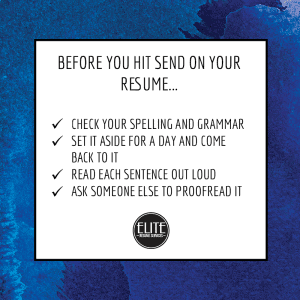
I really hope this blog helps you and your teen feel more confident in putting together a first resume. It’s an exciting time… this piece of paper will help them land their first job! If you’d like to give your teen a leg up, check out our Resume in a Day course.
Resume in a Day gives you access to four guided templates, a suite of video tutorials, the Acing Your Interview ebook, my short course Going Beyond the STAR Method, as well as examples of well done and ‘needs some work’ resume extracts.
With lifetime course access, it’s the gift that keeps on giving.
We respectfully acknowledge the traditional custodians of the land upon which we live and work, the Ngunnawal people.
We acknowledge and respect their continuing culture and the contribution they make to the life of this city and this region, and extend that same respect to all Aboriginal and Torres Strait Islander people.